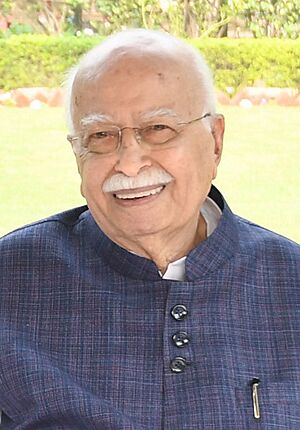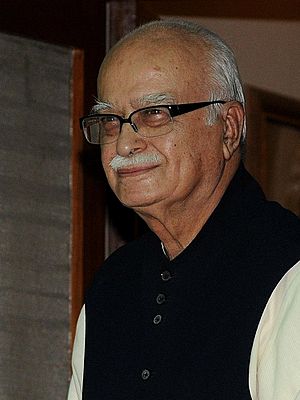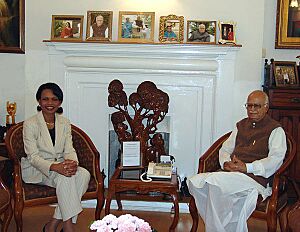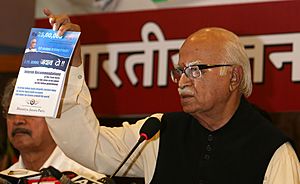L. K. Advani facts for kids
Quick facts for kids
L. K. Advani
|
|
|---|---|

Advani in 2022
|
|
| 7th Deputy Prime Minister of India | |
| In office 29 June 2002 – 22 May 2004 |
|
| Prime Minister | Atal Bihari Vajpayee |
| Preceded by | Devi Lal (1991) |
| Succeeded by | Vacant |
| 21st Union Minister of Home Affairs | |
| In office 19 March 1998 – 22 May 2004 |
|
| Prime Minister | Atal Bihari Vajpayee |
| Preceded by | Indrajit Gupta |
| Succeeded by | Shivraj Patil |
| 16th Union Minister of Coal and Mines | |
| In office 1 July 2002 – 26 August 2002 |
|
| Prime Minister | Atal Bihari Vajpayee |
| Preceded by | Atal Bihari Vajpayee |
| Succeeded by | Uma Bharati |
| 17th Union Minister of Personnel, Public Grievances and Pensions | |
| In office 29 January 2003 – 21 May 2004 |
|
| Prime Minister | Atal Bihari Vajpayee |
| Preceded by | Atal Bihari Vajpayee |
| Succeeded by | Manmohan Singh |
| 6th Leader of the Opposition in Lok Sabha | |
| In office 22 May 2004 – 21 December 2009 |
|
| Prime Minister | Manmohan Singh |
| Preceded by | Sonia Gandhi |
| Succeeded by | Sushma Swaraj |
| In office 24 December 1990 – 25 July 1993 |
|
| Prime Minister | |
| Preceded by | Rajiv Gandhi |
| Succeeded by | Atal Bihari Vajpayee |
| Member of Parliament, Lok Sabha | |
| In office 28 February 1998 – 23 May 2019 |
|
| Preceded by | Vijay Patel |
| Succeeded by | Amit Shah |
| Constituency | Gandhinagar, Gujarat |
| In office 26 November 1989 – 7 May 1996 |
|
| Preceded by | Krishna Chandra Pant |
| Succeeded by | Rajesh Khanna |
| Constituency | New Delhi, Delhi |
| 2nd President of the Bharatiya Janata Party | |
| In office 2004–2005 |
|
| Preceded by | Venkaiah Naidu |
| Succeeded by | Rajnath Singh |
| In office 1993–1998 |
|
| Preceded by | Murli Manohar Joshi |
| Succeeded by | Kushabhau Thakre |
| In office 1986–1991 |
|
| Preceded by | Atal Bihari Vajpayee |
| Succeeded by | Murli Manohar Joshi |
| 5th Leader of the Opposition in Rajya Sabha | |
| In office 21 January 1980 – 7 April 1980 |
|
| Vice President | Mohammad Hidayatullah |
| Preceded by | Kamalapati Tripathi |
| Succeeded by | P. Shiv Shankar |
| 11th Union Minister of Information & Broadcasting | |
| In office 24 March 1977 – 28 July 1979 |
|
| Prime Minister | Morarji Desai |
| Preceded by | Vidya Charan Shukla |
| Succeeded by | Purushottam Kaushik |
| Member of Parliament, Rajya Sabha | |
| In office 3 April 1988 – 30 November 1989 |
|
| Preceded by | Hans Raj Bhardwaj |
| Succeeded by | Jinendra Kumar Jain |
| Constituency | Madhya Pradesh |
| In office 3 April 1982 – 2 April 1988 |
|
| Preceded by | Sawai Singh Sisodiya |
| Succeeded by | Radhakishan Malviya |
| Constituency | Madhya Pradesh |
| In office 3 April 1976 – 2 April 1982 |
|
| Preceded by | Devdatt Kumar Kikabhai Patel |
| Succeeded by | Kumud Ben Joshi |
| Constituency | Gujarat |
| Personal details | |
| Born |
Lal Krishna Advani
8 November 1927 Karachi, Bombay Presidency, British India (present–day Sindh, Pakistan) |
| Political party | Bharatiya Janata Party (1980–present) |
| Other political affiliations |
|
| Spouse |
Kamla Advani
(m. 1965; died 2016) |
| Children | Pratibha Advani (daughter) Jayant Advani (son) |
| Residence |
|
| Alma mater | St. Patrick's High School, Karachi Government Law College, Mumbai |
| Occupation |
|
| Awards | Bharat Ratna Padma Vibhushan |
| Signature | |
Lal Krishna Advani (born 8 November 1927) is a famous Indian politician and statesman. He served as the Deputy Prime Minister of India from 2002 to 2004. He is one of the people who helped start the Bharatiya Janata Party (BJP). This is a major political party in India today. He is also a member of the Rashtriya Swayamsevak Sangh (RSS), a group that promotes Hindu culture.
Advani was the Minister of Home Affairs for a long time, from 1998 to 2004. He was also the Leader of the Opposition in the Lok Sabha (one of India's Parliament houses). He led the BJP as its president for several terms. He was a candidate for Prime Minister in the 2009 general election.
Advani was born in Karachi before India became independent. His family moved to India during the Partition of India and settled in Mumbai. He joined the RSS when he was 14 years old. In 1951, he became a member of the Bharatiya Jana Sangh, an earlier political party. He held many important roles in this party.
In 1970, Advani became a member of the Rajya Sabha (the other house of Parliament). He served there for four terms. After the Janata Party won the 1977 election, Advani became the Minister for Information and Broadcasting. In 1980, he helped create the BJP with Atal Bihari Vajpayee. He was elected to the Lok Sabha for the first time in 1989. He served in the Indian Parliament until 2019.
Advani is known for helping the BJP grow into a major political force. In 2015, he received the Padma Vibhushan, which is India's second-highest civilian award. In 2024, he was given the Bharat Ratna, India's highest civilian honor.
Contents
Early Life and Family
Advani was born on 8 November 1927 in Karachi, which was part of British India. His family was Sindhi Hindu.
He went to school at St. Patrick's High School, Karachi. He also studied at D.G. National College in Hyderabad, Sindh. After India was divided, his family moved to Mumbai. There, he studied law at the Government Law College, Mumbai.
Advani married Kamla Advani in February 1965. They had a son named Jayant and a daughter named Pratibha. Pratibha is a television producer and also helps her father with his political work. His wife passed away in 2016. Advani lives in Delhi.
Starting in Politics
Joining the RSS
Advani joined the Rashtriya Swayamsevak Sangh (RSS) in 1941 when he was 14. He became a full-time worker, called a pracharak. He was the secretary of the RSS unit in Karachi in 1947. After India's partition, he worked as a pracharak in Rajasthan until 1952.
Work with Jana Sangh
In 1951, Advani joined the Bharatiya Jana Sangh (BJS). This political party was started by Syama Prasad Mookerjee with help from the RSS. Advani became a secretary for the party in Rajasthan. In 1957, he moved to Delhi. He became the general secretary and later the president of the Delhi unit of Jana Sangh.
From 1966 to 1967, he led the BJS in the Delhi Metropolitan Council (DMC). After the 1967 election, he became the chairman of the council until 1970. He also helped with Organiser, a weekly newsletter for the RSS.
Entering Parliament
In 1970, Advani became a member of the Rajya Sabha from Delhi. This was his first time in Parliament. In 1973, he was chosen as the president of the BJS.
The Janata Party and Cabinet Role
Advani was re-elected to the Rajya Sabha from Gujarat in 1976. During this time, the Prime Minister, Indira Gandhi, declared a state of "Emergency." Many opposition parties, including BJS, joined together to form the Janata Party.
In the 1977 election, the Janata Party won by a lot. Morarji Desai became Prime Minister. Advani became the Minister of Information and Broadcasting. This government did not last its full five-year term. New elections were held in 1980, and the Janata Party lost. Advani then became the Leader of the Opposition in Rajya Sabha.
Founding the BJP
Early Years of the BJP
On 6 April 1980, Advani and other former Jana Sangh members left the Janata Party. They formed the Bharatiya Janata Party (BJP). Atal Bihari Vajpayee became its first president. In 1982, Advani was elected to the Rajya Sabha for the third time, representing the BJP.
In the 1984 election, the BJP won only two seats. This led the party to change its approach. Advani became the party president. The BJP then focused on the Hindutva ideology, which was important to the Jana Sangh.
Under Advani's leadership, the BJP became very involved in the Ayodhya dispute. This was about building a temple for the deity Rama at the Ram Janmabhoomi site in Ayodhya. The BJP supported this campaign. It became a key part of their election promises for the 1989 elections. This helped the BJP win 86 seats. Advani was elected to the Lok Sabha for the first time. He became the Leader of the Opposition when VP Singh formed the government.
Rath Yatras and BJP's Growth
Advani often organized Rath Yatras, which are special processions. These helped make the BJP more popular and spread the Hindutva message. He led six such yatras across India.
- Ram Rath Yatra (1990): This yatra started from Somnath in Gujarat and aimed to reach Ayodhya. It was linked to the temple dispute. Advani was arrested during this yatra.
- Janadesh Yatra (1993): Four processions started from different parts of the country. Advani led one from Mysore. They aimed to gather public support against certain government bills.
- Swarna Jayanti Rath Yatra (1997): This yatra celebrated 50 years of Indian Independence. It aimed to show the BJP as a party focused on good governance.
- Bharat Uday Yatra (2004): This yatra took place before the 2004 general election.
- Bharat Suraksha Yatra (2006): This yatra focused on national security, fighting terrorism, and other issues.
- Jan Chetna Yatra (2011): This yatra aimed to raise public awareness about corruption and promote the BJP's ideas for good governance.
In the 1991 general election, the BJP became the second-largest party. Advani won from Gandhinagar and became the leader of the opposition again. In 1992, the Babri Masjid was demolished. Advani was later cleared of any wrongdoing by a special court in 2020. The court stated that the demolition was not planned and that Advani was trying to stop the crowd.
In the 1996 general election, the BJP became the largest party. Advani did not run in this election due to some allegations, but he was later cleared by the Supreme Court. Atal Bihari Vajpayee became Prime Minister, but the government lasted only thirteen days.
Home Minister and Deputy Prime Minister
In the 1998 general election, the BJP-led National Democratic Alliance (NDA) came to power. Vajpayee became Prime Minister again. Advani was elected to the Lok Sabha for the third time and became the Home Minister.
The government faced challenges and new elections were called in 1999. The BJP-led NDA won again. Advani won from Gandhinagar for a fourth time. He continued as Home Minister. In 2002, he was also made the Deputy Prime Minister.
Leader of the Opposition
In the 2004 general election, the BJP lost to the United Progressive Alliance led by the Congress party. Manmohan Singh became Prime Minister. Advani won his fifth term in the Lok Sabha and became the leader of the opposition.
After the 2004 defeat, Vajpayee stepped back from active politics. Advani then took on a bigger role in leading the BJP. In 2005, Advani stepped down as party president. Rajnath Singh took his place. In 2006, Advani led a "Bharat Suraksha Yatra" (Journey for National Security). This was to highlight concerns about terrorism and other issues.
Later Years and Prime Minister Candidacy
In December 2006, Advani said he saw himself as a candidate for Prime Minister in the next general elections in 2009. Many in the party supported him, and Vajpayee also endorsed him. On 10 December 2007, the BJP officially announced Advani as their Prime Ministerial candidate for the 2009 elections.
Advani won his sixth term in the Lok Sabha in 2009. However, the BJP lost the general elections to the Congress and its allies. Manmohan Singh continued as Prime Minister. After this defeat, Advani passed the role of leader of opposition to Sushma Swaraj.
In 2010, he was elected working chairman of the National Democratic Alliance. Advani ran in the 2014 general election from Gandhinagar and won for the fifth time in a row. Later, he became part of the Marg Darshak Mandal (vision committee) of the BJP.
Key Positions Held
| Position | Duration |
|---|---|
| Member, Joint Parliamentary Committee on Maintenance of Heritage Character and Development of Parliament House Complex |
8 Oct. 2014 - 25 May 2019 |
| Chairperson, Committee on Ethics | 15 Sep. 2014 - 25 May 2019 |
| Member, Standing Committee on Information Technology | 1 Sep. 2014 - 25 May 2019 |
| Member, Committee on Public Undertakings | 14 Aug. 2014 - 25 May 2019 |
| Member, 16th Lok Sabha | Re-elected in May 2014 (7th term) |
| Member, Joint Parliamentary Committee on Maintenance of Heritage Character and Development of Parliament House Complex |
15 Dec. 2009 |
| Member, Standing Committee on Home Affairs | 31 Aug. 2009 |
| Member, Committee on Installation of Portraits/Statues of National Leaders and Parliamentarians in Parliament House Complex |
4 Aug. 2009 |
| Leader of Opposition, Lok Sabha | May 2009 - 21 Dec. 2009 |
| Member, 15th Lok Sabha | Re-elected in 2009 (6th term) |
| Member, Standing Committee on Home Affairs | 5 Aug. 2006 - May 2009 |
| Leader of Opposition, Lok Sabha | [Period not specified] |
| Member, 14th Lok Sabha | Re-elected in 2004 (5th term) |
| Union Cabinet Minister, Personnel, Pensions and Public Grievances (Additional Charge) |
29 Jan. 2003 - 21 May 2004 |
| Union Cabinet Minister, Coal and Mines (Additional Charge) |
1 Jul. 2002 - 25 Aug. 2002 |
| Deputy Prime Minister | 29 Jun. 2002 - May 2004 |
| Union Cabinet Minister, Home Affairs | 13 Oct. 1999 - May 2004 |
| Member, 13th Lok Sabha | Re-elected in 1999 (4th term) |
| Chairman, Committee on Official Language | [Period not specified] |
| Union Cabinet Minister, Home Affairs | 1998-1999 |
| Member, 12th Lok Sabha | Re-elected in 1998 (3rd term) |
| President, Bharatiya Janata Party | 1993-1998 |
| Leader of Opposition, Lok Sabha | 1991-1993 |
| Member, 10th Lok Sabha | Re-elected in 1991 (2nd term) |
| Chairman, Committee of Parliament on Pay and Allowances | Apr.-May 1990 |
| Chairman, Committee to Review the Lok Sabha Secretariat | 1990-1991 |
| Leader of Opposition, Lok Sabha | [Period not specified] |
| Leader, B.J.P. Parliamentary Party, Lok Sabha | 1989-1991 |
| Member, 9th Lok Sabha | Elected in 1989 |
| Member, Rajya Sabha | Re-elected in 1988 (4th term) |
| President, B.J.P. | 1986-1991 |
| Member, Rajya Sabha | Re-elected in 1982 (3rd term) |
| Leader, B.J.P., Rajya Sabha | [Period not specified] |
| General Secretary, Bharatiya Janata Party (B.J.P.) | 1980-1986 |
| Leader of Opposition, Rajya Sabha | Jan.-Apr. 1980 |
| Union Cabinet Minister, Ministry of Information and Broadcasting | 1977-1979 |
| Leader of the House, Rajya Sabha | [Period not specified] |
| General Secretary, Janata Party | 1977-1980 |
| Member, Rajya Sabha | Re-elected in 1976 (2nd term) |
| Leader, B.J.S., Rajya Sabha | 1974-1976 |
| President, B.J.S. | 1973-1977 |
| Member, Rajya Sabha | Elected in 1970 |
| President, Bhartiya Jana Sangh, Delhi | 1970-1972 |
| Chairman, Metropolitan Council, Delhi | 1967-1970 |
| Leader, Bharatiya Jana Sangh (B.J.S.), Interim Metropolitan Council | 1966-1967 |
| Secretary, Rashtriya Swayamsewak Sangh (R.S.S.), Karachi | 1947 |
Awards and Honors

 India:
India:
 Bharat Ratna (9 February 2024)
Bharat Ratna (9 February 2024) Padma Vibhushan (2015)
Padma Vibhushan (2015)
See also
- Electoral history of L. K. Advani
- Ayodhya dispute
- Bharatiya Janata Party
- Atal Bihari Vajpayee
 | Stephanie Wilson |
 | Charles Bolden |
 | Ronald McNair |
 | Frederick D. Gregory |




